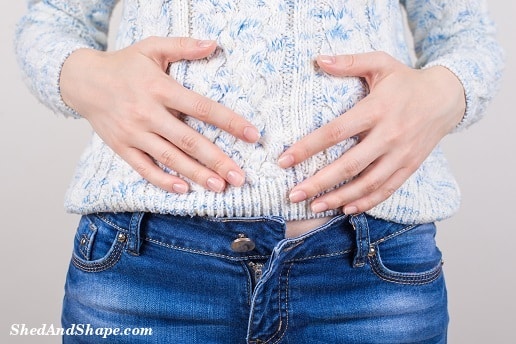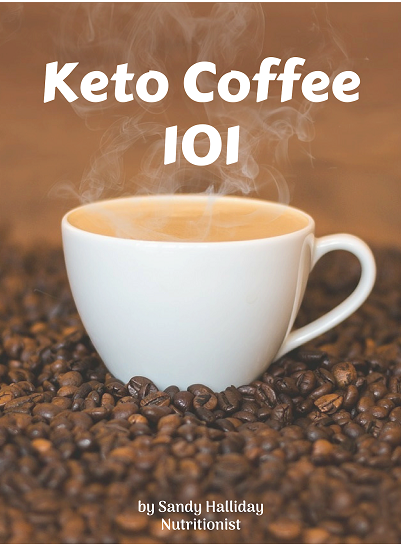If you are bloating on keto you will be relieved to know that it is quite common, but the good news is, this keto side effect will not last long and there are many ways to fix it.
There are many reasons why you could suffer from bloating on keto. As you no doubt know, the keto diet is a type of diet that limits the consumption of carbohydrates. Once you start following the keto diet, you’ll be introducing foods to your body that’s unfamiliar to your digestive system.
This could lead to adverse reactions and side effects, such as bloating. But this is not something dangerous so there’s no need to panic. Besides, this side effect is treatable. Here are some ways on how to fix bloating on keto.
What is Keto Bloating?
First, let us define what keto bloating really is. Bloating is a fairly common symptom of the ketogenic diet. This can happen to beginners and long-term keto dieters. Luckily, this side effect is not a sign of something serious.
Those who suffer from it know that it’s truly annoying. And if you leave it untreated, you will find it difficult to stick to the keto lifestyle and your goal to lose weight will go down the drain.
By definition, bloating is a condition characterized by distension, a feeling of fullness and tightness in the abdominal area. Of course, bloating can happen to anyone and it doesn’t only affect keto dieters. Some of the most common causes of bloating are:
- Constipation
- Swallowing air
- Acid reflux (GERD)
- Indigestion
- Irritable bowel syndrome (IBS)
- Lactose intolerance
- Gut microbial imbalances
- Overeating
In keto, bloating can happen due to many reasons. But the main reason behind bloating on keto has to do with the sudden change of your diet. According to Barbie Boules of Longevity Nutrition,
“Because keto is so different from the way people normally eat, it can cause gas, bloating, constipation, and/or diarrhea.”
But there are ways to fix this condition. However, finding the solution that will work for you could involve lots of trial and error.
How to Fix Bloating on Keto?
The best way to address bloating on keto is to determine the cause behind it. Sure, it can be difficult to determine what causes you to bloat, which is why fixing this condition might require some trial and error. But here are some ways to address bloating on keto.
Eat More Fiber
The most common cause of bloating on keto is the lack of fiber in your diet. When eating the keto way, you are prohibited from eating a lot of fiber rich, carbo-loaded foods such as pasta, grains, bread, rice, and potatoes. However, these foods are some of the best sources of fiber and fiber is important.
Studies show that dietary fiber is important for the normal functioning of the gut. In fact, there are several pieces of evidence proving that having enough intake of fiber can prevent and relieve constipation, which subsequently fights off bloating.
Fiber will help make it easier for your digested food to pass through your intestines. So if you eat less fiber, it’s going to take longer for the food to pass through your digestive system and this is what could make you feel bloated.
In addition the slow-moving foods that linger in your digestive system are prone to fermentation by gut bacteria and this is what causes the development of keto gas.
So how do you introduce fiber to your keto diet? You should eat more leafy greens, avocados, nuts, and chia or flax seeds.
Many articles recommend eating low carb vegetables such as broccoli, kale, cauliflower but these veggies tend to produce gas and possible bloating so it’s not a good idea to increase those to start with.
Lessen your Consumption of MCTs
If you’ve been on the keto diet for a while, then you are probably familiar with the MCT or medium-chain triglycerides. This is a valuable supplement for followers of the keto diet since it helps to speed up the body’s transition into ketosis.
Unfortunately, MCTs have a tendency to cause an upset stomach, especially if taken in excess. Studies done on MCT oil have shown that it could lead to diarrhea, cramps, and bloating.
So try to lessen your consumption of the MCT or totally remove it from your diet. If you really need to take MCT, start with a minimum dose and slowly increase as you progress.
Once your body starts to build tolerance, that’s when you can gradually increase your intake. Using the powder form instead of liquid may be better since the liquid forms tend to upset your stomach even more. Here are more tips on how to prevent upset stomach when using MCT.
Be Mindful of the Foods that You Eat
When transitioning to a low carb diet like keto, you may be introducing a lot of new foods into your body and you could end up eating foods that you have a sensitivity to. For example you may be suddenly eating more nuts, eggs and dairy than you usually do.
Food sensitivity, also known as food intolerance, can happen when you don’t have enough digestive enzymes to break down the foods fully. It is not the same as a food allergy which produces immediate severe symptoms.
With food intolerance the undigested food tends to get fermented by bacteria in the gut and could upset your stomach and cause some bloating. Constant irritation in the gut from fermented food or food reactions can lead to a leaky gut which is also a cause of food intolerance.
One way to try to determine which food or foods are the culprits is to follow an elimination diet. This is best done with a health practitioner.
Bloating could also be caused by a sensitivity to food additives. It’s best to eat only natural foods when you follow a keto diet.
Increase your Water and Mineral Intake
You can expect to lose a lot of water in the first phase of your keto diet. For every 1 gram of glycogen that you lose, that’s equivalent to losing about 3 – 4 grams of water. Aside from water, you’ll also lose potassium and sodium.
You need more magnesium to regulate the level of potassium and sodium in your body and avoid bloating on keto.
The water content in your body is what gives your stool the smooth texture, making it easier for you to eliminate the waste. If you’re dehydrated, there will be less water to aid in your bowel movement and that’s when you’ll suffer from constipation and bloating.
So increase your intake of pure water when following the keto diet. Sip a glass of filtered water with some organic lemon juice in the morning and try to have some low carb soup throughout the day. You can get enough potassium from certain vegetables and fruits like zucchini and avocado.
Final Thoughts
One of the main reasons why so many people love the keto diet is because it allows them to eat different kinds of delicious foods that are healthy and low in carbs. While this is a good thing, this can also affect one’s digestion, which is why bloating is a common problem.
But there are many ways to treat bloating on keto. It will require a bit of experimentation, but once you find the solution that can work for you, then following the keto diet will be easier to do.










